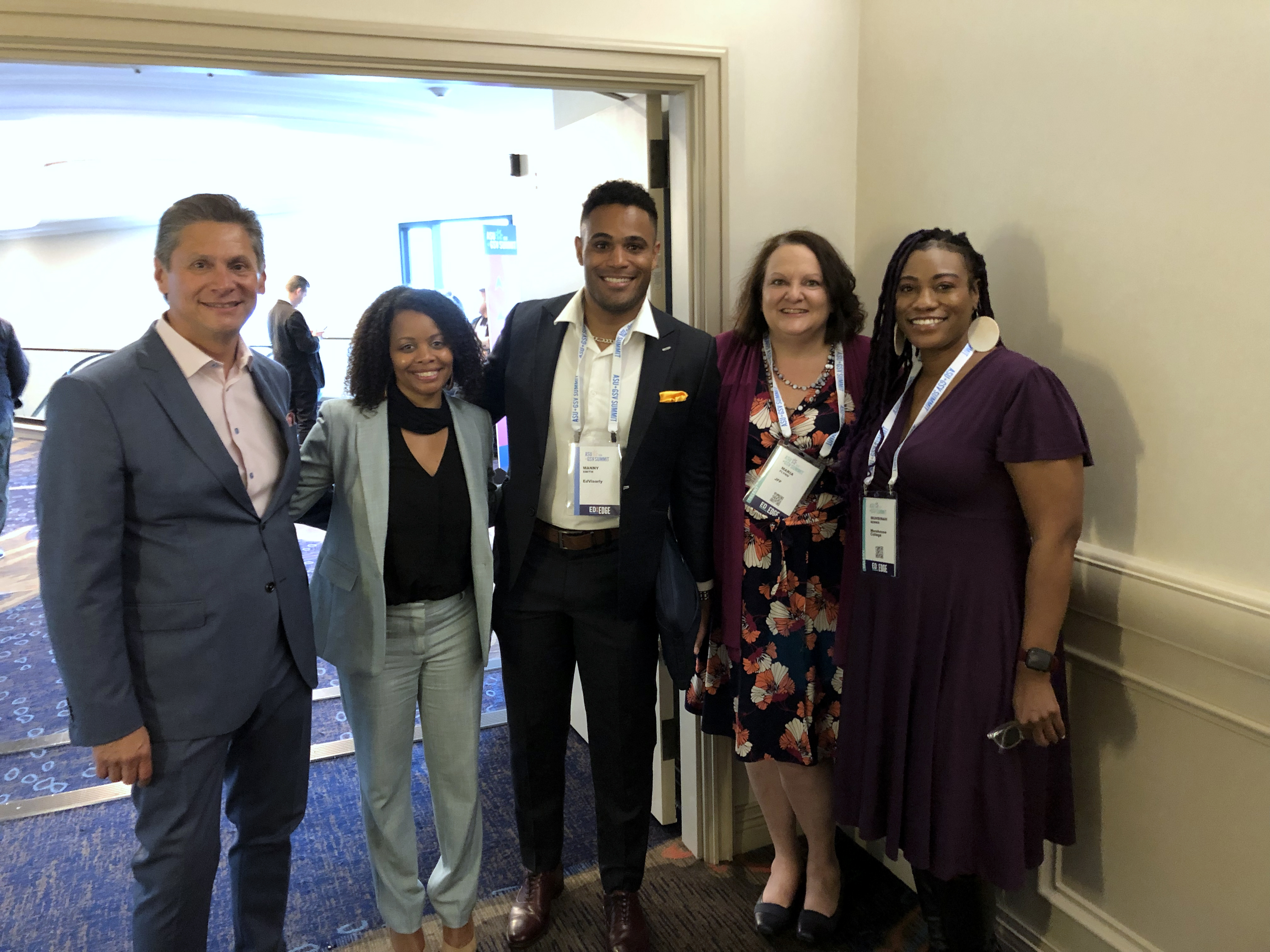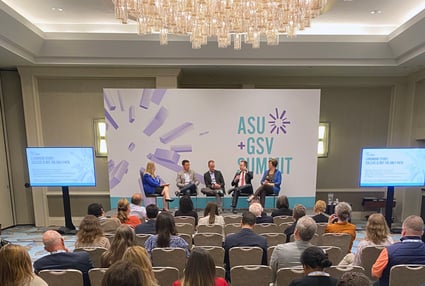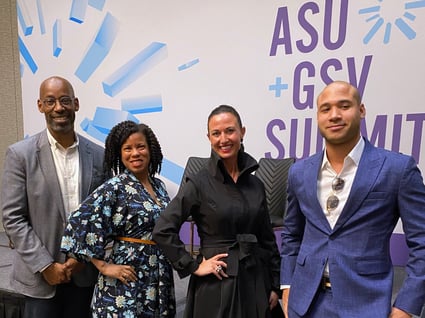4 min read
JFF Experts Push To Transform Our Workforce and Education Systems at ASU+GSV 2022
Patrick Loftus : May 4, 2022

The theme at 2022’s ASU+GSV Summit called for attendees to imagine a new era—one where all people have equal access to the future. JFF showed up ready to meet this challenge and get audiences thinking about where to invest in our workforce and education systems to bridge the gap between where we are today and where we must go.
To prepare America's workforce for the future, intentionally and equitably, leaders across the learn-to-work ecosystem need to consider our current economic landscape and pay careful attention to where change is needed.
At this year’s ASU+GSV Summit, “Ed on the Edge,” attendees left thinking about how climate change, educational technology, equity, labor movements, changes in hiring practices, and more are all shaping and defining the jobs and skills needed in tomorrow’s workforce. Jobs for the Future (JFF) pushed panelists and audiences to consider critical questions:
- Where does change need to happen, ASAP?
- Which actors, institutions, and ways of thinking must play a central role?
- How do we make opportunities for economic advancement accessible to all in this new era?
JFF experts participated in panel discussions that covered disrupting the standard K-16 and credentialing systems, reskilling our workforce for green jobs, rethinking college degree requirements and traditional career paths, and driving equity in the workforce via tech companies and government.
Learn more in the recaps and recordings of our sessions:
The Role of Federal Agencies in Driving Equity
Three Cabinet officials from the Biden administration discuss progress and opportunities to improve economic equity for all. We'll hear about examples of where federal policy and collaboration between departments has improved economic outcomes, and where these leaders will be focusing their efforts in the year ahead to create new solutions for workers and learners in need of support.
Speakers: Maria Flynn, president and CEO of JFF, Jennifer Mishory, Office of Career, Technical, and Adult Education, U.S. Department of Education, Angela Hanks, Department of Labor – Employment and Training Administration, Michele Chang, Department of Commerce, Economic Development Administration
Landmark Study: College is Not the Only Path

Across the nation, employers are collaborating with higher education systems to help solve the employer pipeline issue. But is it enough? With postsecondary enrollment down and only 53 percent of kids likely to go to college, should employers shift their mindset about requiring degrees? What’s the new measure of candidate quality assurance, if not a degree? Join us for the debut of a landmark research study on the perceptions of high-quality, postsecondary pathways and a discussion on the evolving narrative around these options, how to ensure the quality and efficacy of these non-degree options, how to help students and families navigate them, and the role of employers in advancing equitable access to opportunity for learners and workers.
Speakers: David Soo, Chief of Staff at Jobs for the Future, Ryan Craig, Achieve Partners, Jason Tyszko, U.S. Chamber of Commerce Foundation, Pat Leonard, Credly, and Julie Lammers, American Student Assistance
Building Truly Inclusive and Diverse Pathways - What's Working and What's Not
The concept of inclusive growth has become central to economic development due to rising economic inequality and its effects on human well-being and prosperity. Indeed, despite the longest economic expansion in U.S. history through much of the 2010s the Gini index reached 0.485 in 2018—the most inequitable level of income distribution recorded in the United States since the Census Bureau began tracking the metric. This inequality has disproportionately affected communities of color, women, people with disabilities, and certain geographies. For example, between January 1972 and December 2019, other than during the aftermath of recessions, the unemployment rate for Black workers has stayed at or above twice the rate for white workers. The impact of shrinking such inequities would be huge: eliminating disparities in wealth between Black and white households and Hispanic and white households could add $2 trillion to $3 trillion of incremental annual GDP to the U.S. economy. This panel will explore what’s working (and highlight what’s not) to build truly inclusive and diverse pathways.
Speakers: Kristina Francis, Executive Director of JFFLabs at JFF, Leila Makarechi, Merit America, Van Ton-Quinlivan, Futuro Health, and Ryan Golden, McKinsey & Company
The Role of Tech in Racial Economic Equity and Closing the Black-White Wealth Gap

Join us as we discuss tech as an area of opportunity and challenge for economic advancement for Black Americans. Panelists will highlight what Black tech leaders perceive to be the biggest challenges and opportunities for Black learners and workers in digital and IT jobs and careers. Are social and economic conditions ripe for meaningful change in institutions and employer practices and policies? What stands in the way of us leveraging this moment? We’ll discuss what it will take to disrupt occupational segregation, get more Black learners and workers into digital and IT jobs and careers, and the role of digital and tech in closing the Black-white wealth gap.
Speakers: Michael Collins, Vice President at JFF, Gwyneth Gaul, Comcast NBCUniversal, Michael Ellison, CodePath, Dwana Franklin-Davis, Reboot Representation
Career Education: Disrupting the K-16 Model for Equitable Access to Future Jobs
It has been decades since the K-12 and postsecondary systems were established and became the structural systems that still exist today. These systems were created, in part, to provide students the education they would need to achieve career success and equal access to future jobs. However, times have changed, and yet we have not substantially rethought how the structure of our education should work to best serve students and long-term career goals. Over the last few years, innovation has begun to create programs that merge the secondary and postsecondary systems to create education and career pathways that are more appropriate for today’s learners. But is it enough? This panel will discuss the progress of this early work and why further investment is necessary for this area.
Speakers: Joel Vargas, Vice President at JFF, Paymon Rouhanifard, PROPEL AMERICA, Isa Ellis, Bill & Melinda Gates Foundation, Chris Gabrieli, Empower Schools, Lydia Logan, IBM, Marty Lange, National Geographic Learning – Cengage
(Header photo caption - L to R: Eloy Oakley, California Community Colleges Chancellor; Kristina Francis, Executive Director JFF Labs; Manny Smith, Founder and CEO, EdVisorly; Maria Clark, President and CEO, JFF; Muhsinah Morris, Ph.D. Director of Virtual Reality Project, Morehouse College)


